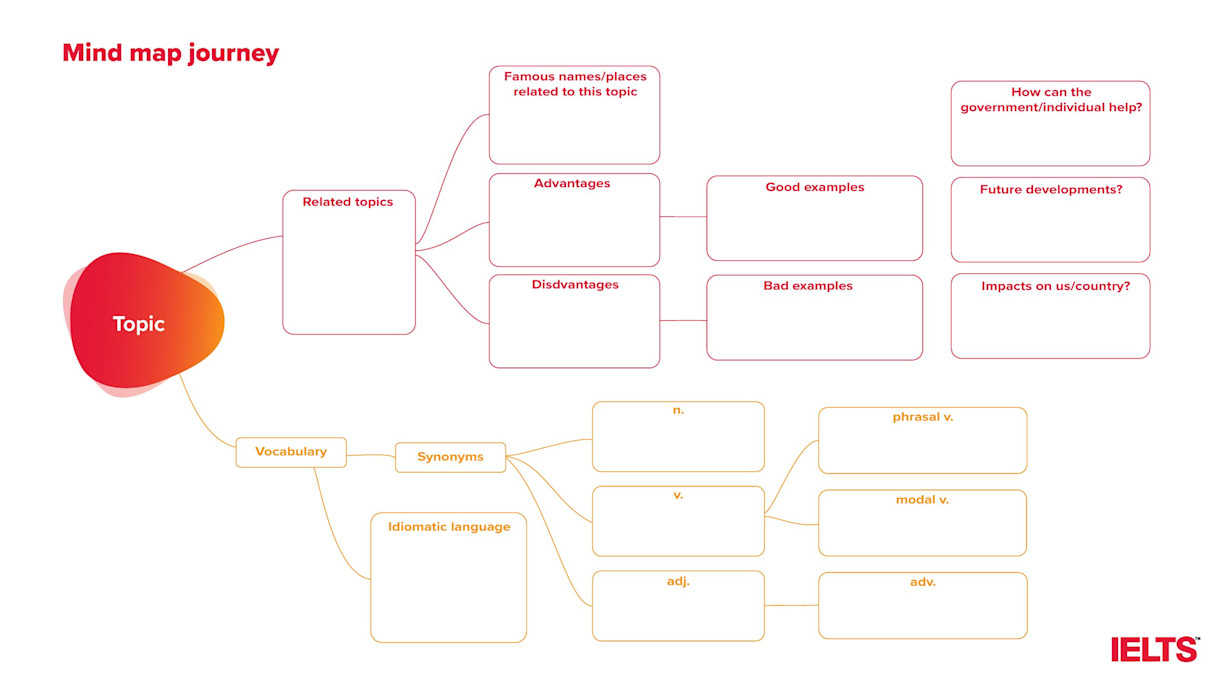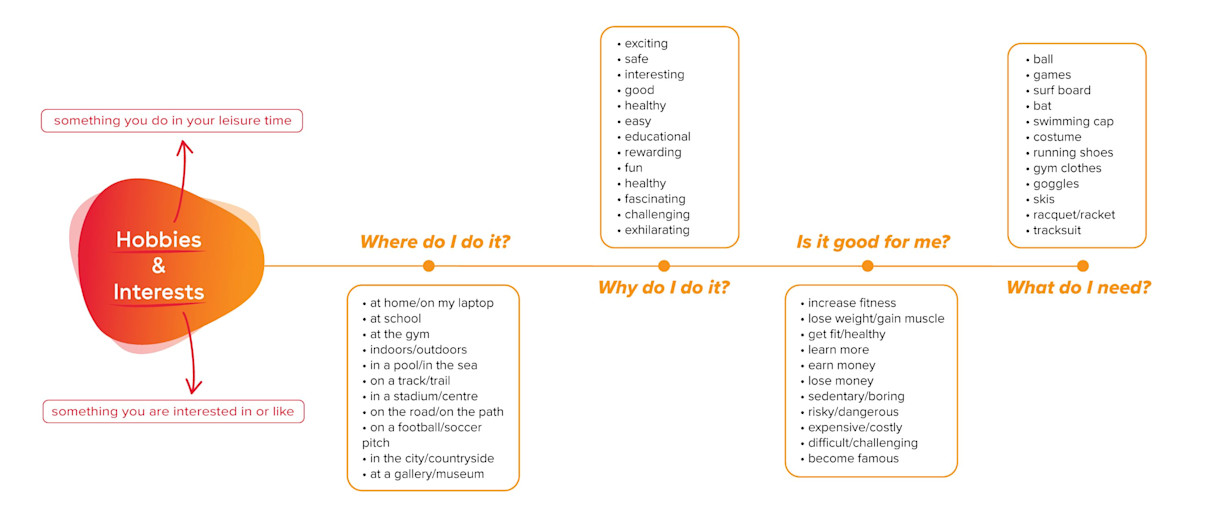When we learn a language, not only do we learn words and phrases that relate to everyday survival, we also pick up language related to everyday topics, things that are happening in the world around us. When you prepare for an IELTS test, you need to get familiar with a wider range of topics to make it easier for you to access appropriate vocabulary and ideas related to these topic areas.
Having a wide vocabulary range is one of the keys to a great performance. You can build your vocabulary resource by reading daily, watching English programmes and movies, singing in English and by studying word lists. By increasing your range of vocabulary, it is easier to think of what to say quickly and it helps to understand the topics you are listening to, reading, writing, or speaking about.
One easy way to build your vocabulary resource is to create mind maps.
What is a mind map?
Mind maps are an easy way to help organise your ideas. They are also a great way to prepare for IELTS as you will have all of your ideas and language connected to one topic in one place. A mind map is made when you brainstorm a topic area.
Let’s think of a very simple mind map. If I said, IELTS, you would immediately think of words and ideas connected to the IELTS test. If you write all the words you know about IELTS, you will have a lot of words connected to testing as you have done tests in school from a very young age.
test | exam | reading | writing | listening | speaking | examiner | write | computer | learn | paper | time | run out of time | difficult | spelling | grammar | vocabulary | time management | easy | recording | start | true | false | not given | task | essay | question | passport | overview | graph | process | lexical resource | verb | cohesion | pronunciation | letter | paragraphs | discuss | effect
However, even though you have a long list of words in no particular order, you need to organise this language and ideas you may have in a way that makes it easier for you to remember and use on test day. It will not only help you prepare for the IELTS test, it will also mean that you can communicate better and understand more using English.
How do I make a mind map?
Mind maps can come in many shapes and forms. You might be a person that likes lists, numbering all of your ideas and words, or you may like to use boxes, or circles, or to highlight key words with arrows and colour. Your mind map needs to include as much language connected to the topic as you can.
The most important function of a mind map is to organise information into logical groups to help you remember what you have written. From the perspective of English as a second language, you will also include parts of speech in your diagram to remind you which verbs, nouns, adverbs, adjectives and phrasal verbs you should use when thinking about a particular topic.
A mind map can be divided into two areas covering:
Ideas and examples
Vocabulary (parts of speech)
We have created a mind map journey to show you how it's done:

Choose a topic from the list at the bottom of this article and then think of ideas related to it.
To help create your mind map, choose words that describe these ideas and examples that will make your description clearer. Also, think about positive and negative elements connected to your ideas.
You should then think about your topic in the past, the present, and how it could change in the future. Think of how you are connected to this topic, you, your country, your city and then think of how the government or other people and places are connected to the topic.
We have started a mind map about the environment, but have not finished it. See how we link ideas with vocabulary, building a mind map that will help us to talk or write about the environment.

Simple mind maps
Some of us like to work with lists and find them easier to memorise. A simple mind map can be made if you think about how the topic area affects you directly. Your mind can work like this when you are presented with a question about something you do. For example, the topic area might be 'interests and hobbies'.
Ask yourself the following questions:
Why do I do it?
Where do I do it, and why?
Is it good for me, and why?
What equipment do I need, and why?
You can guess from reading my answers below that I am talking about swimming. All words in bold are vocabulary connected to swimming. Because I have access to this vocabulary, it helps me to think of what to say and makes it easier to extend all of my answers appropriately.
I swim because it keeps me really fit and more importantly helps with my asthma.
I train at the local community pool because it's a 50 metre pool so I have to swim a bit further to get to the other end. I choose this pool as it's generally quiet and I usually get a lane to myself.
Swimming is a great sport as it helps your cardio-vascular fitness. It also builds muscle and helps with flexibility, so it's good for people who are older, like me.
You don't need that much equipment unless you want to join a squad and train. Your basic requirements are a cap and goggles and of course, a pair of togs. You need goggles as the pools in Australia have a lot of chlorine and it will sting your eyes. If you want to get into a squad and do some training, you will need a kick board and fins.
Look at the following mind map and choose your favourite hobby or interest and answer the 4 questions above. Try and use some of the vocabulary from the four boxes.

Now, it's your turn!
We have given you some ideas on how to create mind maps, now it's time for you to try. Start by completing the environment mind map and then look at the other common IELTS topic areas below.
This will take some time, however, by trying to brainstorm vocabulary and ideas for each one, you will create your very own topic library and can add to it when you learn new phrases and related language.
the environment
leisure and entertainment
tourism
learning and education
the internet
crime and punishment
health and diet
travel
transport
social media
sport and competition
art and music
modern lifestyles and societal changes
traditions and customs
fashion and advertising
employment
Increasing your vocabulary over a wide range of topics will help when you read, write, listen and speak to people. You will also be more prepared, being able to access the language and ideas you need more easily, so can do your very best on a test day.
